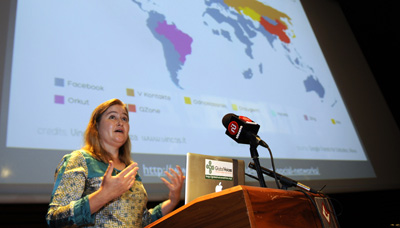The Internet doesn’t bring freedom. Not automatically, anyway.
That’s one of the main messages of Rebecca MacKinnon’s new book, Consent of the Networked, which had its New York launch at the offices of the New America Foundation last night. In a conversation with CNN managing editor Mark Whitaker, MacKinnon, a CPJ board member, said it’s up to concerned citizens, governments, and corporations to make decisions about how the Internet is used. She contrasted the Twitter-powered revolt in Egypt last year with the “networked authoritarianism” of China, where corporations are collaborators in a system designed to preserve Communist Party rule.
“China is Exhibit A for how an authoritarian government evolves and survives in the Internet world,” MacKinnon said.
By now, Chinese authorities’ savvy use (or abuse) of new technologies to maintain its hold on power is old news. But it came as a surprise to the foreign reporters who were living in China, as MacKinnon was, when the Internet first made its appearance there.
“The Communist Party will never survive the Internet” was the consensus, she recalled. “That was in 1995.”
In 2012, there are plenty of examples of the Internet’s power to affect change in China. (Earlier this week, I pointed out a study showing that the Chinese government can be surprisingly responsive to scandals reported in the local media and online.)
But MacKinnon emphasizes that this does nothing to chip away at Communist Party authority. In fact, she argues, these Internet-fueled scandals may actually help keep the party in power, by improving governance at the local level. Any attempt to use the Internet to call for broader political reform gets shut down quickly, and can land a person in jail. Just ask Liu Xiaobo.
MacKinnon’s book is about a lot more than China. Much of her focus is on corporations that hold enormous power in our privacy protections, the limits of our expression, and our ability to connect online. In some cases, these Internet corporations can enhance our rights and promote democracy. But just as easily, she points out, they can make people more vulnerable or extend a government’s reach.
She makes the argument that we’re having a Magna Carta moment. For those of you, like me, who had to consult Wikipedia for a reminder of what exactly the Magna Carta was all about, here’s the gist: In 1215, the English people forced their king to accept a set of limits on his heretofore unquestioned power. In 2012, says MacKinnon, it’s time for us to acknowledge the great power we’ve put in the hands of our kings — Google, Facebook, and Twitter, to name just a few — and get down to the task of limiting it.
